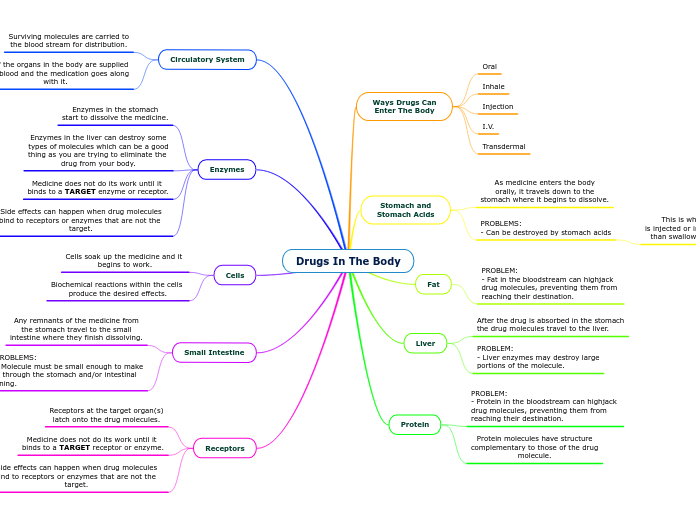によって Rylee Beach 4年前.
636
Drugs In The Body

Drugs In The Body
Receptors
Medicine does not do its work until it
binds to a TARGET receptor or enzyme.
Receptors at the target organ(s)
latch onto the drug molecules.
Small Intestine
PROBLEMS:
- Molecule must be small enough to make
it through the stomach and/or intestinal
lining.
Any remnants of the medicine from
the stomach travel to the small
intestine where they finish dissolving.
Cells
Biochemical reactions within the cells
produce the desired effects.
Cells soak up the medicine and it
begins to work.
Enzymes
Side effects can happen when drug molecules
bind to receptors or enzymes that are not the target.
Medicine does not do its work until it
binds to a TARGET enzyme or receptor.
Enzymes in the liver can destroy some
types of molecules which can be a good
thing as you are trying to eliminate the
drug from your body.
Enzymes in the stomach
start to dissolve the medicine.
Circulatory System
All of the organs in the body are supplied
with blood and the medication goes along
with it.
Surviving molecules are carried to
the blood stream for distribution.
Protein
Protein molecules have structure
complementary to those of the drug
molecule.
PROBLEM:
- Protein in the bloodstream can highjack
drug molecules, preventing them from
reaching their destination.
Liver
PROBLEM:
- Liver enzymes may destroy large
portions of the molecule.
After the drug is absorbed in the stomach
the drug molecules travel to the liver.
Fat
PROBLEM:
- Fat in the bloodstream can highjack
drug molecules, preventing them from
reaching their destination.
Stomach and
Stomach Acids
PROBLEMS:
- Can be destroyed by stomach acids
This is why insulin
is injected or inhaled rather
than swallowed as a pill.
As medicine enters the body
orally, it travels down to the
stomach where it begins to dissolve.
Ways Drugs Can
Enter The Body
Transdermal
I.V.
Injection
Inhale
Oral

